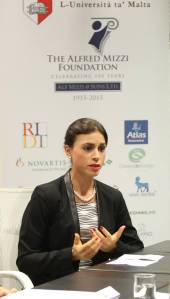What is the link between the Maltese lifestyle and diabetes type 2? And how will figuring this out help health professionals and the general public? Here, Dr SARAH CUSCHIERI MD explains the thought-process and the implications of The University of Malta’s Health and Wellbeing Study, SAĦĦTEK.
 In 1981 a diabetes mellitus type 2 prevalence study was conducted; its findings are still used to predict the diabetes burden on Malta’s healthcare system today.
In 1981 a diabetes mellitus type 2 prevalence study was conducted; its findings are still used to predict the diabetes burden on Malta’s healthcare system today.
But life and lifestyle in Malta have changed greatly since then – and, with more of us eating a westernised diet (as opposed to the more-Mediterranean oriented one back then), and fewer of us exercising, among other factors, that study has now become almost obsolete.
And that’s where SAĦĦTEK comes in.
Over the years ‘it is expected that the diabetes and obesity frequencies in Malta have increased,’ reads the project’s official document. ‘The increase in diabetes also comes from the strong family history of diabetes mellitus type 2 in Malta.’
‘[Moreover], there has never been a representative survey covering the prevalence of obesity, hypertension, physical activity, smoking and alcohol consumption in Malta [and], therefore, the burden of this disease has been based on estimations.’
Now, the University of Malta’s Health and Wellbeing Study, SAĦĦTEK, is looking to rectify the situation and Dr Sarah Cuschieri MD, with the help of Dr Julian Mamo, the Head of the Department of Public Health, is at the helm of this ambitious project.
“When we first started, my assumptions were that we would find a small percentage of the population that was diabetic,” explains Dr Cuschieri, an assistant lecturer at the Department of Anatomy within the Faculty of Medicine and Surgery. “The actual preliminary results, however, have shown that a large percentage of the sample population is diabetic (newly diagnosed, as well as already-known), and that the majority of them are either overweight or obese, too.”
Dr Cuschieri’s role in this project is manifold, and ranges from taking care of the logistics, all the way to calling participants with abnormal results. And the results – good or bad – are what makes this project such a valuable one.
“The results have many factors that need to be analysed and compiled, which include an update of the prevalence of type 2 diabetes among adults and the prevalence of pre-diabetes (those prone to becoming diabetic), obesity, hypertension, physical activity, smoking and alcohol consumption, among others,” she says.
“We also assess the risk factors affecting the Maltese population that are contributing to the development of type 2 diabetes, pre-diabetes and obesity, as well as the analysis of a number of diabetic genetic Single Nucleotide Polymorphism, (which is a DNA sequence variation occurring commonly within a population) within the normal, pre-diabetic and diabetic population,” she continues.
The benefits of doing all this are many, and there are several different sectors that will benefit from this project. On the one hand, participants will benefit from having their measurements taken (blood pressure, weight, etc) while also learning about their predisposition to developing diabetes and high-blood pressure.
On the other, policy makers will now know what the current situation is with regards to the frequency of diabetes type 2, pre-diabetes, obesity, high blood pressure, smoking and alcohol habits among the population. Moreover, the study will also identity the risk factors that lead to these diseases, giving them an idea of how they could be managed. Indubitably, what helps the policy makers will also help take care of the nation’s health.
As a project, SAĦĦTEK has the financial backing of the Alfred Mizzi Foundation as the main sponsor; while support of the Faculty of Medicine and Surgery, Atlas Insurance, the Ministry for Energy and Health through the Parliamentary Secretary  for Health, and the Research Trust is also notable. “RIDT has been of great help to this project,” explains Dr Cuschieri. “It not only provided substantial financial support but also helped in the initial PR of the project and launch.”
for Health, and the Research Trust is also notable. “RIDT has been of great help to this project,” explains Dr Cuschieri. “It not only provided substantial financial support but also helped in the initial PR of the project and launch.”
The project has commenced again in September and the team behind SAĦĦTEK will contact people living in the towns that have not yet been screened. While there’s no doubt that this project is a mammoth task, once compiled, it will prove to be extremely important for Malta’s public and private health sectors, as well as for the many who are prone to suffer from diabetes type 2. We urge all those who receive an invitation to participate and join us in understanding the health of the Maltese population.
You can be part of this fascinating world of research too by supporting many other researchers in all the faculties of the University of Malta. Please click here for more information on how to donate to research of this kind through the Research Trust (RIDT).Sahhtek – Health and Wellbeing Study
